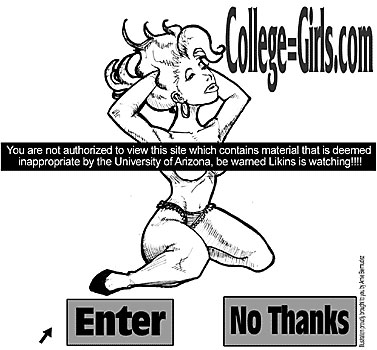Arizona Daily Wildcat
Wednesday October 22, 2003

Illustration by Arnulfo Bermudez
|
|
Last week, the Arizona Daily Wildcat reported that code of conduct violations involving students viewing pornography in UA residence halls are going unpunished. Though the university has the power to restrict Internet abuse, it hardly seems interested in doing so. We asked our columnists: Should the UA care enough to crack down?
|
Personal freedom comes above all
Let's be honest here, the pornography restriction in residence halls is one of those laws set as a polite formality, not as something to be enforced ÷ if it were, I'd certainly see residents come out of their rooms a lot more than I do now. In other words, the law's there so that people in high places can look the other way without making legislators ÷ like former Republican Jean McGrath ÷ blush.
After all, regardless of our opinions of pornography, we most likely all agree that censorship is the greater evil. And censorship is exactly what it would take to eliminate access to porn. System-wide content filters would have to be in place, and if we think back to high school network days, that would mean the inability to access all kinds of information, not just porn. After all, by flagging "breasts," information on breast cancer would be unavailable. It's not just "boobies," "porn," and "XXX" that will get caught in the filter.
Besides, we're all adults here. While it's understandable that the state doesn't "technically" want it's money linked to a porn free-for-all via high speed Internet, it's also understood that students have the right to access what they will on their computers from the Web, which is nothing if not a worldwide public forum. With the good comes the bad · or at least the kinky. The Center for Computing and Information Technology knows to choose its battles by cracking down on truly illegal activity rather than wasting its resources to come between college students and · uh, indoor recreation.
Sabrina Noble is a senior majoring in English and creative writing. She can be reached at letters@wildcat.arizona.edu.
Censorship infringes academic freedom
Would blocking salacious Web sites prevent dorm residents from viewing pornography on their computers?
Such restrictions have been proposed in hopes of doing just that. However, those who think this will work have either never lived in dorms or have forgotten dorm life altogether.
Students make an effort to do what they are told they shouldn't do. In the cases of drugs and alcohol, the effects can be disastrous, and it is appropriate for administrators to make an extra effort to prevent rebellious students from hurting themselves and others. However, no matter how unpalatable some find pornography on the Internet, it is not illegal for people over 18 ÷ which accounts for most dorm residents ÷ to view it, and the case can hardly be made that it endangers innocent bystanders.
Censoring what students can view on the Internet quickly leads to the blockage of legitimate research and impedes academic freedom.
If society's values lead it to outlaw pornography for everybody, then administrators have every right to keep it from dorm computers. Until then, blocking legal Web sites could lead only to Orwellian waywardness on the part of administrators, who could soon censor controversial political views and hamper valid research as well.
Kendrick Wilson is a political science junior. He can be reached at letters@wildcat.arizona.edu.
 |
|
Daniel Scarpinato
columnist
|
|
|
Porn can be dirty, privacy isn't
Cracking down on the viewing of porn in residence halls is a waste of valuable time and money. Plus, it cuts at the core of personal privacy.
See, people in power tend to think that they have this blessed duty to monitor and control things that they label as "public vices."
First it was alcohol, something the state of Arizona and this university have done a great job of glamorizing through silly rules and regulations. Still, most will hand them authority on that issue, given the potential danger alcohol use could pose to others.
But porn is a different story. Legal adults in the privacy of their own dorm rooms should be allowed, perhaps even encouraged, to view whatever they choose.
If anything, the university in its role as a state agency should be trumpeting the free flow of information and the exercise of free speech and the First Amendment.
For goodness' sake, if the girls and guys in power at this university spent as much time gearing up the academic engines of the UA as they spend monitoring moral issues, this would be a first-rate institution.
It might be hard to defend the viewing of porn, which some view as vulgar and demeaning, but it's easy to defend individual rights, personal responsibility and privacy, and the First Amendment of the United States of America.
Daniel Scarpinato is a journalism and political science senior. He can be reached at letters@wildcat.arizona.edu.
 |
|
Jessica Lee
associate editor
|
|
|
Students should keep Internet chastity belt on
As students who are attending the UA to expand our minds and engage in intellectual dialogue, it is disappointing to know that many undergraduates are spending much of their college experience boxed up in their dorm rooms looking at porn.
It is anti-social, it is disturbing and it is flat-out disgusting.
But the university cannot be governed by some abstract philosophical or ethical argument. The censoring of "uneducational" material is not only impractical, but would require additional funds from an already strapped university piggy bank. The dean of students cannot possibly send out herds of porn police to make sure students are containing their urge to view strangers engaged in illicit acts.
It is not the responsibility of the university or Residence Life to shelter students from problems in the real world. Porn addiction can be problematic to society and offensive to people who view nudity and sex as sacred.
The porn industry often plagues my life. Why? There is a well-known Playboy model who shares my name ÷ some of you may be a fan of her. People have cracked jokes about her in front of me and one time as a prank, a friend gave me her Playboy poster spread.
Porn cannot be censored in the dorms, but students do have the ability to grow up.
Jessica Lee is an environmental science senior. She can be reached at letters@wildcat.arizona.edu.
Pornography should be allowed to stay
Should we ban porn in the residence halls? The answer to this question depends greatly on whom you ask. Some believe pornography is an art form; others find it repulsive. When you boil everything down and look at the heart of this issue, you'll find it is more a matter of taste or preference than anything else.
Some people don't like porn so it has to go. That doesn't sound quite right. If that's the standard we hold as to what gets censored and what doesn't, then we will quickly find nothing on the airwaves or anywhere else for that matter. Everyone finds something offensive that somebody else finds entertaining or informative.
Just the other day I was grossed out by the show "Fear Factor." There I was just flipping through a few channels, only to suddenly become audience to a poor girl squeezing the juice of a cow eyeball into a glass, using only her mouth. Not the most pleasant thing to see. But do I feel it should be banned because I found it disgusting? Absolutely not, but it would be, using the same standards that would ban
pornography.
"Fear Factor" may be different from pornography, but the same underlying issue remains: taste. You may not like or agree with it but that's not a good enough reason to ban other people from watching it.
Jason Poreda is a political science and communication senior. He can be reached at letters@wildcat.arizona.edu.
Porn should be private
What students choose to look at on their personal computers should be no one's business. If students make the choice to view pornography, then so be it ÷ whether one thinks this activity is morally defective is irrelevant. The university does not have the job of dictating what is moral or ethical and what is not; it is in the business of shaping the intellectual minds of the future.
The legal age required to view pornographic materials is 18, so if the university censors porn sites on the school ethernet, it is contradicting public law. The UA is a public university, not a private or religious institute, so it should leave the moral/ethical molding to its students.
Porn sites on the Internet have a disclaimer saying that you must be 18 years old to view the graphic images. However, we all know that people under 18 can view the material with great ease. If the university can find a way to regulate the porn viewing of students under 18, then that's great, because at least it will be in accordance with the law. If students at the university don't like the law, then they should try to have it changed.
The university is trying to influence behavior, but this move toward censorship would only have short-term effects and would be the first step on a slippery slope toward giving the school precedence in regulating other behaviors it deems unsavory.
Ryan Scalise is a political science senior. He can be reached at letters@wildcat.arizona.edu.
